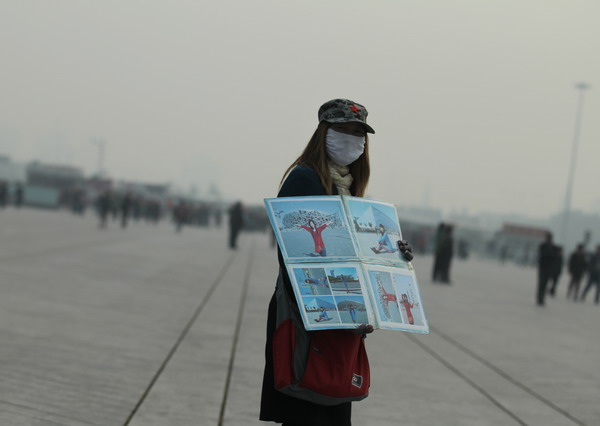

Despite Wang Zhangyi's excitement for a school-organized autumn outing on Friday, a trip he had been looking forward to for weeks, his mother was nothing but reluctant and anxious.
"I'm concerned for his health when he's exposed to serious air pollution and breathing smog," said Zhang Huihui, the mother of the 6-year-old who was recently enrolled in elementary school.
 |
|
A woman shows blue sky photos of Beiing at a time when the capital was shrouded with serious smog again on Friday. The WHO's cancer agency classified air pollution as cancer causing. [Wang Jing/China Daily] |
Serious pollution again blanketed Beijing on Friday, with high levels of PM2.5 pollution - particulate matter with a diameter smaller than 2.5 micrometers.
The downtown area saw PM2.5 levels reaching 190 micrograms per cubic meter, and levels in southern suburbs, including Fangshan and Daxing districts, rose to more than 200 micrograms per cubic meter, according to the Beijing Environmental Monitoring Center.
The capital is shrouded with serious smog from time to time, despite its determination to fight the hazy days with ongoing efforts.The center suggested residents use public transportation instead of their private vehicles and warned children, the elderly and those with heart and breathing problems to stay indoors.
Parents were left only to sacrifice their children's health or make up an excuse to keep them home from school, which would only frustrate the children and draw discrimination from their peers, Zhang said.
Zhang's worries are not without reason. The International Agency for Research on Cancer, part of the World Health Organization, declared on Thursday that air pollution is a carcinogen, alongside known dangers including asbestos, tobacco and ultraviolet radiation. It's the first time the agency classified air pollution as cancer causing, with the main sources of pollution widespread, covering transportation, power plants, industrial and agricultural emissions.
To better protect children, the capital has recently outlined an emergency plan requiring kindergartens and schools to suspend classes when serious pollution is predicted in the following three days.
The Beijing Commission of Education will ask kindergartens and elementary and middle schools to suspend physical education classes, outdoor activities or all classes based on the degree of pollution. The children aren't aware of how to protect themselves and it's the adults' responsibility to take care of them, it said.
Since air pollution in the city is not evenly distributed, with certain regions witnessing lower pollutant levels, the warnings will be issued based on different regions.
Wang Hao, a physical education teacher in Beijing's Chaoyang district, said that missed school days will be added during the summer or winter vacations.
When to enforce the new rules and how to punish schools that don't comply is still under discussion.
However, parents, like Zhang, face a new dilemma in finding care for their children when school is canceled because of pollution. "The government should come up with detailed measures, considering all possibilities of the plan," Zhang said.
zhengxin@chinadaily.com.cn